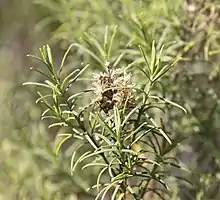| Cassinia macrocephala | |
|---|---|
 | |
| Near Mount Kaputar | |
| Scientific classification | |
| Kingdom: | Plantae |
| Clade: | Tracheophytes |
| Clade: | Angiosperms |
| Clade: | Eudicots |
| Clade: | Asterids |
| Order: | Asterales |
| Family: | Asteraceae |
| Genus: | Cassinia |
| Species: | C. macrocephala |
| Binomial name | |
| Cassinia macrocephala | |
Cassinia macrocephala is a species of flowering plant in the family Asteraceae and is endemic to northern New South Wales. It is a shrub with narrow linear leaves and spherical, white to cream-coloured or yellowish-green heads.
Description
Cassinia macrocephala is a shrub that typically grows to a height of 1–2 m (3 ft 3 in – 6 ft 7 in) with a few erect stems. The leaves are narrow linear, 20–70 mm (0.79–2.76 in) long and 0.7–2.0 mm (0.028–0.079 in) wide, depending on subspecies. The flowers heads are spherical, white to cream-soloured or yellowish-green and arranged on a peduncle, each head with five to seventeen white florets surrounded by involucral bracts. The achenes are purplish brown, about 1 mm (0.039 in) long with a pappus of 20 to 27 barbed bristles about 2 mm (0.079 in) long.[2]
Taxonomy and naming
Cassinia macrocephala was first formally described in 2004 by Anthony Edward Orchard in Australian Systematic Botany from specimens collected near Moonbi in 2004.[3] The specific epithet (macrocephala) means "large-headed".[4]
In the same journal, Orchard described two subspecies and in 2006 two further subspecies in a later edition of Australian Systematic Botany, and the names of the four subspecies are accepted by the Australian Plant Census:
- Cassinia macrocaphala Orchard subsp. macrocephala[5] has leaves 30–70 mm (1.2–2.8 in) long, 1–2 mm (0.039–0.079 in) wide and usually 15 to 17 florets per head;[6]
- Cassinia macrocaphala subsp. petrapendula Orchard[7] has leaves 25–55 mm (0.98–2.17 in) long, 0.7–0.8 mm (0.028–0.031 in) wide and usually 5 to 7 florets per head;[8]
- Cassinia macrocaphala subsp. storyi Orchard[9] has leaves 60–70 mm (2.4–2.8 in) long, 1.3–1.5 mm (0.051–0.059 in) wide and usually 8 florets per head;[10]
- Cassinia macrocaphala subsp. storyi Orchard[11] has leaves 30–35 mm (1.2–1.4 in) long, 0.7–1.0 mm (0.028–0.039 in) wide and usually 9 or 10 florets per head;[12]
Distribution and habitat
This species of Cassinia grows on granite soils in forest in New South Wales.[2] Subspecies macrocaphala occurs on the Northern Tablelands,[6] subsp. petrapendula is only found in a restricted area near Nundle,[8] and subsp. storyi is only known from the type location near Coolah Tops[10] and subsp. tenuis near Inverell.[12]
References
- ↑ "Cassinia heleniae". Australian Plant Census. Retrieved 20 June 2021.
- 1 2 "Cassinia macrocephala". Royal Botanic Garden Sydney. Retrieved 20 June 2021.
- ↑ "Cassinia macrocephala". Australian Plant Name Index. 20 June 2021.
- ↑ Sharr, Francis Aubi; George, Alex (2019). Western Australian Plant Names and Their Meanings (3rd ed.). Kardinya, WA: Four Gables Press. p. 246. ISBN 9780958034180.
- ↑ "Cassinia heleniae subsp. macrocephala". Australian Plant Census. Retrieved 20 June 2021.
- 1 2 "Cassinia macrocephala subsp. macrocephala". Royal Botanic Garden Sydney. Retrieved 20 June 2021.
- ↑ "Cassinia heleniae'' subsp. petrapendula". Australian Plant Census. Retrieved 20 June 2021.
- 1 2 "Cassinia macrocephala subsp. petrapendula". Royal Botanic Garden Sydney. Retrieved 20 June 2021.
- ↑ "Cassinia heleniae subsp. storyi". Australian Plant Census. Retrieved 20 June 2021.
- 1 2 "Cassinia macrocephala subsp. storyi". Royal Botanic Garden Sydney. Retrieved 20 June 2021.
- ↑ "Cassinia heleniae subsp. tenuis". Australian Plant Census. Retrieved 20 June 2021.
- 1 2 "Cassinia macrocephala subsp. storyi". Royal Botanic Garden Sydney. Retrieved 20 June 2021.